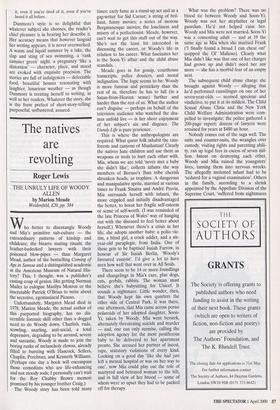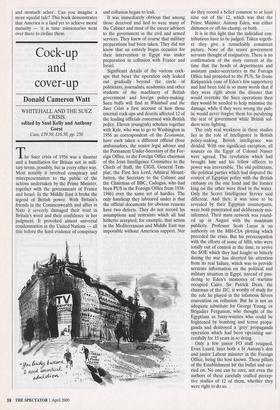The natives are revolting
Roger Lewis
THE UNRULY LIFE OF WOODY ALLEN by Marion Meade Weidenfeld, £20, pp. 384 Who better to disentangle Woody and Mia's primitive sub-culture — the extraordinary patterns of kinship and childcare; the bizarre mating rituals; the feather-bedecked lawyers with their poisoned blow-pipes — than Margaret Mead, author of the bestselling Coming of Age in Samoa and a distinguished academic at the American Museum of Natural His- tory? This, I thought, was a publisher's casting coup of genius, like getting Norman Mailer to eulogise Marilyn Monroe or the inscrutable Patrick O'Brian to write about the secretive, egomaniacal Picasso.
Unfortunately, Margaret Mead died in 1978. Marion Meade, the actual author of this purported biography, has no dis- cernible forensic skill other than a dogged need to do Woody down. Churlish, rude, scowling, snarling, anti-social, a total depressive, degrading to be around, severe and sarcastic, Woody is made to join the boring ranks of melancholy clowns, already filled to bursting with Hancock, Sellers, Chaplin, Perelman, and Kenneth Williams. (Perhaps one day a book will encompass those comedians who are life-enhancing and not moody sods; I personally can't wait for the Roy Chubby Brown memoir promised by his younger brother Craig.) The Woody story has been told many times: early fame as a stand-up act and as a gag-writer for Sid Caesar; a string of bril- liant, funny movies; a series of morose Bergmanesque movies; the loneliness and misery of a perfectionist. Meade, however, can't wait to get this stuff out of the way. She's not the least bit interested in discussing the career, or Woody's life in relation to his career. What fascinates her is the Soon-Yi affair and the child abuse scandals.
Meade goes in for gossip, courthouse transcripts, police dossiers, and moral indignation. The logic seems to be: Woody is more famous and pernickety than the rest of us, therefore he has to fall (in a Satan-from-Heaven sense) further and harder than the rest of us. What the author can't disguise — perhaps on behalf of the television audience who watched the dra- mas unfold live — is her sheer enjoyment of her subject's sin and disgrace. The Unruly Life is pure prurience.
This is where the anthropologists are required. What queer folk inhabit the rain- forests and canyons of Manhattan! Clearly the natives hate children and use them as weapons or tools to hurt each other with. Mia, whom we are told 'never met a baby she didn't like', collects infants the way members of Borneo's than tribe cherish shrunken heads, as trophies. A dangerous and manipulative sprite, married at various times to Frank Sinatra and Andre Previn, Mia surrounds herself with infants, the more crippled and initially disadvantaged the better, to boost her fragile self-esteem or sense of self-worth. (I was reminded of the late Princess of Wales' way of hanging out with the diseased to feel better about herself.) Whenever there's a crisis in her life, she adopts another baby: a polio vic- tim, a blind girl, a crack addict, and a six- year-old paraplegic, from India. One of these gets to be baptised Isaiah Farrow, in honour of Sir Isaiah Berlin, 'Woody's favoured essayist'. I'd give a lot to have seen how well that went over in All Souls.
There seem to be 14 or more foundlings and changelings in Mia's care, plus dogs, cats, gerbils, rabbits. The woman must believe she's babysitting for Unicef. It sounds a nightmare. Little wonder, then, that Woody kept his own quarters the other side of Central Park. It was there, one afternoon, that Mia came across porno polaroids of her adopted daughter, Soon- Yi, taken by Woody. Mia went berserk, alternately threatening suicide and murder — and, one can only surmise, calling the adoption agency for the most pestiferous baby to be delivered to her apartment pronto. She accused her partner of incest, rape, statutory violations of every kind. Looking on a good day 'like she had just left a mental hospital or was on her way to one', now Mia could play out the role of martyred and betrayed woman to the hilt, and in full view of her brood — some of whom were so upset they had to be packed off for therapy. What was the problem? There was no blood tie between Woody and Soon-Yi; Woody was not her stepfather or legal guardian. He'd not helped raise her. Woody and Mia were not married. Soon-Yi was a consenting adult — and at 19 the same age as Mia when she married Frank CI finally found a broad I can cheat on!' quipped the 01' Mafioso). Clearly what Mia didn't like was that one of her charges had grown up and didn't need her any more — she has a morbid fear of an empty nest.
The subsequent child abuse charge she brought against Woody — alleging that he'd performed cunnilingus on one of her seven-year-olds — seemed specious and vindictive, to put it at its mildest. The Child Sexual Abuse Clinic and the New York Child Welfare Administration were com- pelled to investigate; the police gathered a 200-page report; dozens of lawyers were retained for years at $400 an hour.
Nobody comes out of the saga well. The suits and counter-suits, the wrangles over custody, visiting rights and parenting abili- ty, ran up legal fees in excess of seven mil- lion. Intent on destroying each other, Woody and Mia ruined the youngsters' lives, turning them into nervous wrecks. The allegedly molested infant had to be `sedated for a vaginal examination'. Others in the family, according to a shrink appointed by the Appellate Division of the Supreme Court, 'suffered from nightmares and stomach aches'. Can you imagine a more squalid tale? This book demonstrates that America is a land yet to achieve moral maturity — it is time missionaries went over there to civilise them.























































































 Previous page
Previous page